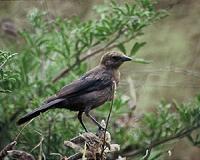| . |  |
. |
Barcelona, Spain (SPX) Mar 09, 2011 Improved environmental conditions have enabled the otter (Lutra lutra) to spread in Andalusia over the past 20 years. However, the recovery of populations of this mammal has been "relatively" slow, and in some areas the impact of human activities still prevents the species from gaining a foothold. "The high level of 'humanisation' of the landscape still acts as a strong impediment to the expansion of the otter, to such an extent that it is preventing the species from fully recovering its original distribution area", Miguel Clavero, lead author of the study and a researcher at the Forestry Technology Centre of Catalonia and the Donana Biological Station (CSIC), tells SINC. The study, which has been published in the Journal of Biogeography, shows that the otter (Lutra lutra) is "rare" in the most humanised areas, and tends to be permanently present along the "least affected" river courses. "Otters prefer to occupy lowland rivers, where food is most abundant, but these are precisely the areas that are most affected by human activities", explains Clavero. The scientists studied 1,038 sub-basins in Andalusia, which were sampled during the three national otter surveys carried out in 1985, 1995 and 2005 and coordinated by the Spanish Society for the Conservation and Study of Mammals (SECEM). The results show that otters have undergone a "marked" recovery over the past 20 years. The presence of this species in the rivers of Andalusia has increased by around 70%, and its spread has been "widespread" throughout most of the Iberian Peninsula. The researcher says that the increase in the otter's distribution area in Andalusia is above all due to it having colonised river courses with "moderate" human impact. At the start of the 1980s, otter populations occupied regions with natural conditions, but after this it started to occupy systems that were more affected by human action. "Nowadays, the mammal is still seen infrequently in the most humanised environments", the scientist says.
Less pollution, more otters The researchers say these compounds were the principal causes of the "drastic" decline in the species in the 1970s and 1980s. Otter populations that survived this period "are now acting as sources for colonisation of nearby areas". However, the speed of this expansion is at "only" a little more than one kilometre per year. "This result is surprising, above all because of the species' capacity to rapidly colonise large areas of territory", stresses Clavero. The improved quality of water-based ecosystems, above all in terms of pollution, could directly help the otter, as well as the increase in the abundance of fish, its principal prey. Another factor is the widespread availability of a new trophic resource, the red swamp crayfish (Procambarus clarkii), which was introduced in the mid-1970s, and which is now very abundant in low and medium altitude rivers and wetlands in Andalusia. The scientists suggest that the future management of otter populations should focus on conserving and improving their aquatic habitats. "These measures would encourage greater distribution of the species and be of greater benefit to the aquatic environments than carrying out specific actions for this species", the Spanish authors explain.
Share This Article With Planet Earth
Related Links FECYT - Spanish Foundation for Science and Technology Darwin Today At TerraDaily.com
 Fossil Bird Study Describes Ripple Effect Of Extinction In Animal Kingdom
Fossil Bird Study Describes Ripple Effect Of Extinction In Animal KingdomGainesville FL (SPX) Mar 09, 2011 A University of Florida study demonstrates extinction's ripple effect through the animal kingdom, including how the demise of large mammals 20,000 years ago led to the disappearance of one species of cowbird. The study shows the trickle-down effect the loss of large mammals has on other species, and researchers say it is a lesson from the past that should be remembered when making conserva ... read more |
|
| The content herein, unless otherwise known to be public domain, are Copyright 1995-2010 - SpaceDaily. AFP and UPI Wire Stories are copyright Agence France-Presse and United Press International. ESA Portal Reports are copyright European Space Agency. All NASA sourced material is public domain. Additional copyrights may apply in whole or part to other bona fide parties. Advertising does not imply endorsement,agreement or approval of any opinions, statements or information provided by SpaceDaily on any Web page published or hosted by SpaceDaily. Privacy Statement |